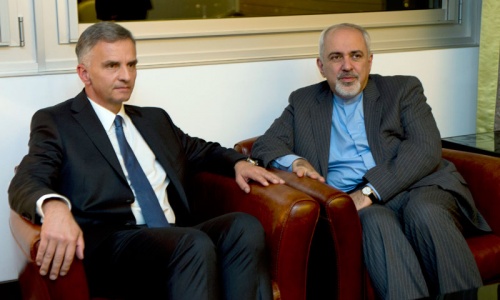ABOARD AIR FORCE ONE: The White House says President Barack Obama has phoned Israeli Prime Minister Benjamin Netanyahu to discuss a tentative deal with Iran over its nuclear program.
White House spokesman Josh Earnest told reporters traveling with Obama on Sunday that the United States looks forward to consulting with its ally Israel on international negotiations with Tehran. Earnest says the White House understands Israel's skepticism about Iran's intentions.
In an early morning announcement, Tehran agreed Sunday to a six-month pause of its nuclear program while diplomats continue talks aimed at preventing Iran from developing a nuclear weapon.
Netanyahu criticised the deal, calling it a ''historic mistake'' and saying he was not bound by the agreement.
UN Secretary-General Ban Ki-moon said the accord “could turn out to be the beginnings of a historic agreement for the peoples and nations of the Middle East region and beyond.”
The deal was widely praised as a step towards making the world safer but Israel criticised the deal as giving the Islamic republic too much and failing to guarantee it would not get the bomb.
Here are the main reactions to the Geneva deal:
US President Barack Obama “Today, the United States, together with our close allies and partners, took an important first step toward a comprehensive solution that addresses our concerns with the Islamic Republic of Iran's nuclear programme.”
US Secretary of State John Kerry “This first step, I want to emphasise, actually rolls back the programme from where it is today, enlarges the breakout time, which would not have occurred unless this agreement existed. It will make our partners in the region safer. It will make our ally Israel safer.”
Iran Supreme Leader Ayatollah Ali Khamenei: “God's grace and the support of the Iranian nation were the reasons behind this success.” ”Resistance against excessive demands should be the criteria for (nuclear) officials.”
Iranian President Hassan Rouhani: “This agreement benefits all regional countries and global peace.” "Constructive engagement (in addition to) tireless efforts by negotiating teams are to open new horizons.”
Israeli Prime Minister Benjamin Netanyahu: “What was achieved yesterday in Geneva is not a historic agreement but rather a historic mistake.”
Israeli Foreign Minister Avigdor Lieberman “This agreement is the greatest diplomatic victory of Iran, which has gained recognition for its so-called legitimate right to enrich uranium.”
Exiled opposition group National Council of Resistance of Iran: “The 'forced' retreat by the religious dictatorship ruling Iran... was a direct result of international sanctions and the Iranian people's widespread opposition to the Supreme Leader's policies.” ”Any leniency, hesitancy and concessions by the international community will prompt Khamenei to once again move towards manufacturing nuclear weapons through deception and cheating.”
Russian President Vladimir Putin “A breakthrough step has been made, but only the first on a long and difficult path.” ”As the result of talks... we managed to get closer to untying one of the most difficult knots in world politics.”
Chinese Foreign Minister Wang Yi “This agreement will help to uphold the international nuclear non-proliferation system, (and) safeguard peace and stability in the Middle East.”
British Foreign Secretary William Hague “Iran has made a lot of concessions, a lot of commitment here, as part of a 'first step' deal.”
French President Francois Hollande: “The interim accord reached overnight is an important step in the right direction... towards stopping Iran's military nuclear programme and therefore normalising our ties.”
European Union President Herman Van Rompuy “It is now crucial to ensure punctual implementation of the agreement reached and to continue working, on the basis of the trust that is being built, towards a definitive settlement of this issue.”
Syrian Foreign Ministry Syria “considers it to be a historic accord which guarantees the interests of the brotherly Iranian people and acknowledges their right to the peaceful use of nuclear energy.”
Japanese Foreign Minister Fumio Kishida “Our country has consistently called on Iran to exercise flexibility on the matter. We want to keep a close watch in a way to help implement this agreement.”
Indian Foreign Ministry spokesman Syed Akbaruddin “India welcomes the prospect of resolving questions related to Iran's nuclear programme through dialogue and diplomacy.”
Palestinian president spokesman Nabil Abou Roudeina “The international efforts that concluded in Geneva should be a chance to activate the role of the Quartet for the Middle East (United States, Russia, EU, UN) to end the Israel-Palestinian conflict.”
IAEA Director General Yukiya Amano The deal “is another important step forward following the agreement reached between the Agency and Iran on 11 November... With the agreement of the IAEA's Board of Governors, the Agency will be ready to fulfil its role in verifying the implementation of nuclear related measures.”














































Dear visitor, the comments section is undergoing an overhaul and will return soon.